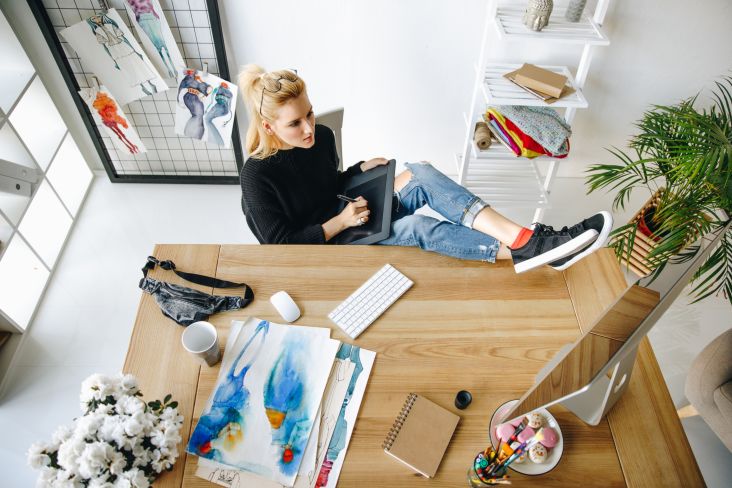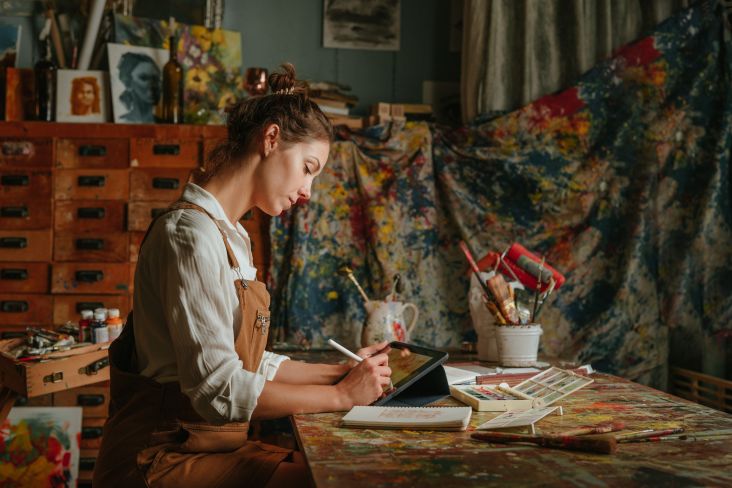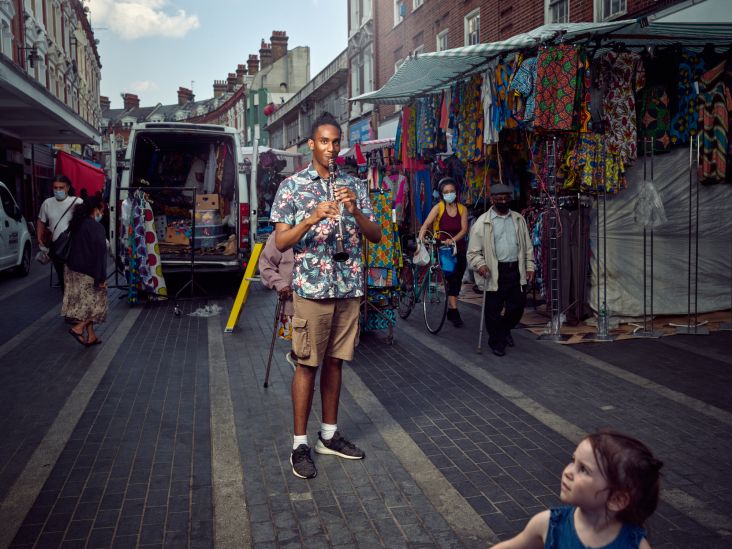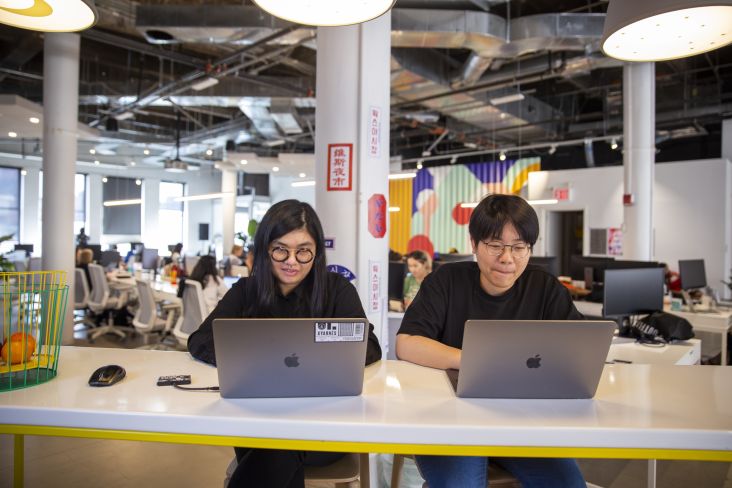How to survive and thrive during the Great Resignation as a creative freelancer
Every year, on the last day of January, Brits are supposedly most likely to quit their jobs. And this year, as office-based work and the dreaded commute return, it looks like more people could be changing careers than ever before. For creative professionals, that might mean a shift to freelancing.

Image licensed via Adobe Stock
Right now, going freelance could be a wise option for creatives, as the global pandemic and so-called Great Resignation has led to a higher demand for freelancers everywhere. According to Worksome, nearly half of freelancers across the UK and the United States saw increased demand as a result of Covid-19 in 2021, with companies struggling to source talent and fill vacancies.
It's certainly positive news for the creative industries and anyone who has launched their own business, as freelancing offers so much potential during an uncertain jobs market. It could also offer a better work-life balance and overall job satisfaction, as Worksome's survey also found that nearly three-quarters of freelancers are happier working solo while 61% claim to have more free time.
However, freelancing isn't the solution to all your problems. It might offer more flexibility and get you away from awful office politics and drama, but it's still going to involve lots of hard work. It just brings different kinds of challenges along with the ongoing pressure to keep earning. It's a steep learning curve and one that will turn you into a multi-tasker as you handle your own accounts, marketing, taxes, and much much more.
Anyone who considers freelancing will be aware of the downsides and will undoubtedly prepare themselves for the leap – that's whether they've saved a buffer or built a strong network of clients beforehand. So if you're fresh into freelancing and you want to know how to survive, particularly as more creatives start businesses in 2022, then the following tips from the creative community will help.
Keep things super cheap
You don't need a co-working desk or an office. There's no need to increase your overheads if you don't have to. Because the more you spend, the more you have to work. And higher costs mean you can't take as many risks and stay competitive, or you have to agree to work that you wouldn't otherwise take on. Think carefully before adding to your costs, even though working from home can sometimes be tedious.
If you really must get out of your house, try little spouts at coffee shops with other freelancers or "drop-in" co-working spaces, just to break up the routine.
Get comfortable with money
Some of us like to stick our heads in the sand when it comes to money. I'm one of them. But when you freelance, you've got to be fully aware of your income versus costs, your taxes and your accounts. It's essential to your survival.
For illustrator Niki Groom, she even carries out an annual review: "I reassess my finances at the start of every year. I look at what areas brought me money in and what I'm going to pay attention to for the year ahead." It's planning like this that will keep you on track and even determine where you focus your time and energy.
Get out there and network
With everything getting back to normal, you can attend events, go for coffee with relevant contacts, and make lucrative connections that might lead to work. People love doing business with people. Be memorable, be kind, be open to anything that might come your way.
"Build connections with other freelancers, too," says Tom Davis, a freelance motion designer. "If you're too busy, then send them work. Chances are they'll reciprocate. Other freelancers aren't your competition. They're your community and support network."
If you're worried sending work to other freelancers might backfire, illustrator Rosie Phillport offers this reassurance: "Although it's competitive, I always recommend other freelancers for jobs I can't take on, and as a result, people repay the favour and recommend me. I never worry about my client not using me again. It's often the opposite as they are appreciative you helped them out!"
Make an effort with existing clients
Because finding new clients is much harder. "My most valuable assets are my regular clients," says Nottingham-based artist and designer Mark Leary. "We laugh and joke, send each other nonsense. They are the biggest advocates of my work, as they regularly shout about me to their friends or peers in the industry. Keeping them on my side is easy and fun. It also keeps me sane."
It's the same story for Tom Woolley, a freelance illustrator and map-maker based in Birmingham. "Be reliable and easy to work with," he says. "Try and gain repeat work from existing clients."
Photographer and videographer Thom Bartley says it's often surprising how expectations never match up to reality: "Freelancers vastly overestimate how important the quality of their work is to a client and hugely underestimate how important being a nice person, reliable and easy to work with is. Average creatives with great people skills usually out-earn ace creatives who are a pain to deal with."
But of course, everyone is busy. Which means your clients will be too. They'll always need things sorted but will often forget to ask for help. Pick up the phone or drop an email reminding them that you exist and are ready for work. You'll be surprised how this simple action will result in fresh jobs. "Also, sprinkle on moments of surprise and delight to show clients you're the best and remind them why they hired you," adds Lucy Yates, a communications consultant in Manchester.
Don't neglect your marketing
Dedicate a little time each day to boosting your reputation. That's whether you write a new blog post, tweet a few people you want to work with, or contribute to an article such as this. "I prioritise my marketing like my paid client work," says Denise Strohsahl, a brand consultant based in Edinburgh. "I have a clear, unique selling point, and I promote my services consistently, both on and offline."
When it comes to marketing, Emily Penny, founder of Be Colourful in Brighton, urges us to "be a business and a brand, not a freelancer". What she means by this is to think beyond your sole operation. Think of yourself as something much bigger, more powerful. And dedicate time to build your brand. "Tell your story and keep offering lots of value as you market your business," adds writer Masooma Memon. "This has helped me not just survive but thrive. Over time, the brand that you build doubles as a lead market, sending clients your way organically."
"Update regularly," says Deborah Parkes, founder of Clayhill Arts. "This not only keeps you top of feed but also helps you to think about what you have been working on and what you have in development. Share details of your news, your current and in-progress work so that future clients can see your process and understand how you work."
Have multiple revenue streams
You don't have to rely on freelancing work to make a living. Side projects can help fill the gaps during quieter periods. For illustrator Roshi Rouzbehani, she found success through publishing: "Personal passion projects that I care about help me to stay profitable," she says. "I self-published a book in 2020 and am still selling it online."
Tom Davies has a side project that's helped him enormously over the years. "I have Loop which is what I can focus on when freelance work is low. It helps hone my skills and has the added benefit of bringing in additional income each month," he says.
However, if side projects don't bring reliable income, Roshi adds "there's no shame in working part-time in non-creative jobs." Having the backing of a part-time job might give you the freedom to experiment and perfect your freelance business before you do it full-time.
Remember that time is money
How you spend your time is important, as every working hour should count towards income. That might mean avoiding any speculative work. "Take the free out of freelancing. Never do spec work," says Colin McDermott, a freelance specialist in SEO. "If a random agency contacts you out of the blue to write a proposal for someone they are pitching, you might not get the work even if they win. Focus on your own work and clients."
That also means treating freelancing as a business. "It's not a hobby," adds Tom Davis. "It's your livelihood. This mindset is perhaps the biggest thing that's helped me because it brings confidence when talking about money, invoices, contracts and all the business side of things." As we all know, having confidence and respecting your time will work massively in your favour, so stay focused to remain profitable.
Build on your strengths
We've all got something unique about ourselves that sets us apart from the competition. We should embrace our strengths to win those clients. "I think it's not just about being the right freelancer, but also the right person for the job or project," agrees Austria-based artist and illustrator Carina Lindmeier. "Often, it's not about creative or technical skills but also about your story and your character that make you stand out."
If that's the case, then take some time to celebrate your plus points and communicate them on your website, portfolio and social media bios. Why are you special? What makes you better than other freelancers? Write a value proposition to get to grips with your USP and then shout from the rooftops why you're awesome, which leads nicely onto our next point.
Carve out a niche for yourself
That's because "Owning a niche can be transformative for solo workers," says Matt Saunders, a business coach for creatives based in Leeds. "Finding one that tallies with your personal values is vital for sustainability, and it means you can stand out, do meaningful work and charge a premium."
Writer Luc Benyon agrees and finds that you can play into the areas others might lack. "So if a sector is very formal, pitch yourself as creative. Bring something fresh and different, and you'll stand out," he says.
"It's something that's always worked for me, understanding my strengths and finding a niche," says Manchester-based conceptual illustrator Ollie Hirst. "Not being afraid to turn down work if I don't think it fits in with 'me'. In my opinion, it's much better to be known for brilliantly illustrating certain topics than being just average across the board."
Charge what you're worth
If you're going to survive difficult times, you might assume that having a cheaper day rate will help. Personally, I believe you should always charge what you're worth as clients don't solely consider costs when hiring freelancers – they also look at the quality of output, along with the level of skills and experience.
To spread the risk, try increasing your day rate the next time someone inquires about your services. What harm can it do to test the water? Besides, they can always knock you down on price, so starting with a higher price point is often better.
"If you're worried about what to charge, start with the full-time income that someone like you needs for a year to live and adjust accordingly for holidays, sick days, and unbillable hours," says illustrator Tofunmi Yosola. "Then you can determine your hourly rate. Just remember to charge for value, not hours, and consider an hourly rate only as a red line or back up."
For further tips, read our article on how to raise rates as a freelancer.
Don't forget to look after yourself
Burnout is a familiar word in the freelancing community. It occurs when we don't give ourselves enough time to rest. Yes, there's the natural desire to "make hay while the sun shines", particularly during uncertain times like a global pandemic or recession. But you really have to prioritise downtime – not just to stay healthy and happy, but productive, too.
Obvious tips include staying hydrated throughout the day, prioritising good sleep by avoiding caffeine past midday, not drinking alcohol during the week, and getting away from your desk frequently to move around and keep your body happy. But there's also the important topic of good posture and avoiding any repetitive strain injuries. A decent supportive chair, correct desk setup and placing your screen at eye level will go a long way to avoiding any issues. Watch ergonomics expert Jon Cinkay as he shows us how to make our desk and office chair adapt to ourselves.
Joe Kibria, an art director at Apple in London, adds this final important point: "Make the most of downtime. Time not working can be very anxiety-inducing, so it's good to stay creative, work on personal projects, and build or maintain relationships." Of course, any time spent being creative is time well spent in our books.

























